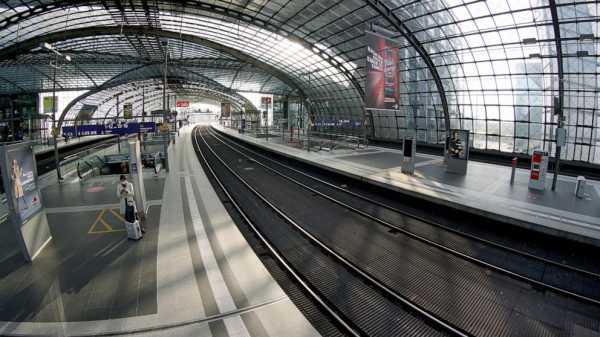
BERLIN — Mediators on Wednesday presented their proposal to end a long-running pay dispute between Germany's main national railway operator and a major union, a two-year settlement that would head off damaging all-out strikes.
The EVG union agreed last month to take the dispute to arbitration after talks with state-owned operator Deutsche Bahn broke down. The union, which already staged hours-long or one-day “warning strikes,” a common tactic in German negotiations, had threatened to move on to open-ended strike action. The mediators, former government minister Thomas de Maiziere and labor lawyer Heide Pfarr, started work last week.
The pair on Wednesday presented a proposal that they said was backed by both Deutsche Bahn and EVG negotiators, but it will still need the approval of EVG members in a ballot in the coming weeks.
It centers on a pay increase of 410 euros ($453) per month in two stages as part of a deal that would be valid for 25 months. There would also be a one-off, tax-free payment in October of 2,850 euros for each employee to counter high inflation.
The government, trying to address the impact of rising prices while preventing an inflationary spiral, has been keen to promote such tax-free payments, which have featured in other wage deals in recent months.
EVG originally sought a 650-euro raise, or 12% for railway workers at higher pay grades, and for a salary agreement to be valid for 12 months rather than Deutsche Bahn’s proposed 27 months.
Pfarr said it would be “the most expensive wage settlement in the history of Deutsche Bahn." But she said that “an open-ended strike with an uncertain outcome (would) be prevented, along with reputational damage to both Deutsche Bahn and EVG.”
The union's chief negotiator, Kristian Loroch, said the proposal would mean that “almost all members will benefit from a wage rise in the double-digit percentage area.”
During the dispute, Deutsche Bahn accused EVG of trying to score points in a bitter, long-held rivalry with the other main railway workers’ union — and the settlement, if approved, may only be the prelude to the next dispute. The rival and traditionally more aggressive union, GDL, is due to start negotiations for its members this fall.
The past few months have seen plenty of tense salary negotiations in Europe’s biggest economy as inflation remains high, currently above 6%.
In April, government officials and labor unions reached a pay deal for more than 2.5 million public-sector workers, ending a lengthy dispute after arbitrators were called in to propose a compromise.
Sourse: abcnews.go.com






